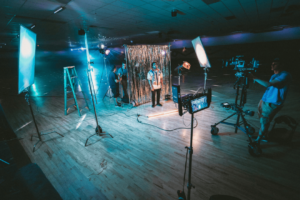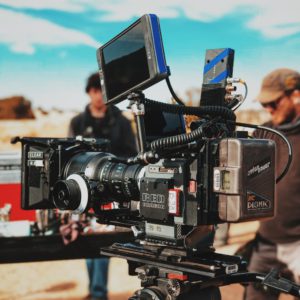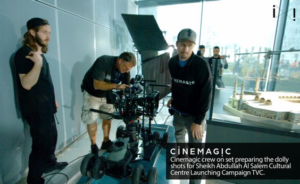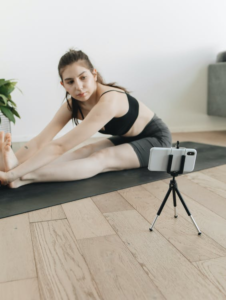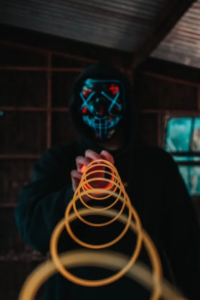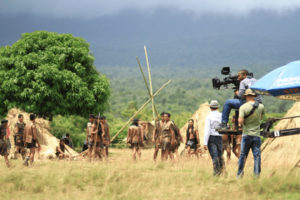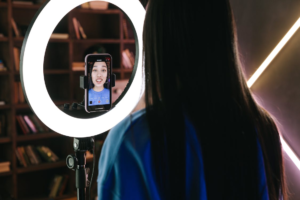A first camera assistant, also called a first assistant camera, 1st assistant camera, 1st AC, first AC, camera technician, assistant cameraman, focus puller, or B camera, manages the camera crew and gear on a film set.
The first AC works under the cinematographer or director of photography. A person in this role will recommend cameras, lenses, and other support gear. They run the camera department and also keep the camera in focus.
The camera department itself is a key component of any video production. After all, this crew does everything from working on the look and feel of a film project to cleaning the equipment. The first camera assistant plays an integral role within any film’s camera department.
What Does a First AC Do?
A first assistant camera sits next to the camera while filming, operating the focusing ring of the lens. They keep the correct subject in focus throughout every scene.
Sound simple? Many film professionals think this is actually one of the most difficult jobs on set. The 1st AC needs to not only get the shot in focus but also keep it there. A good first assistant camera will be able to keep an actor in focus through multiple takes, even when the actor doesn’t move at the same speed every time.
It’s also the first assistant camera’s job to maintain and organize all the camera equipment and accessories on a set. That means cleaning the camera lenses and setting up and taking down the camera every day.
Just like everyone else in the camera department, the first assistant camera reports to the director of photography. During pre-production, the first camera assistant works with the director of photography, also known as the cinematographer, to help create the vision of the director and choose the camera lenses. During production, a typical day includes unloading gear with the rest of the department then prepping the camera, getting ready for rehearsal, and blocking. While the second camera assistant lays down the marks for actors and camera positions, the first assistant camera observes and prepares the plan.
In the words of Doug Hart, whose credits as a first camera assistant include “Manhattan” and “Stepmom,” the job means keeping the camera running so it does whatever the director of photography wants it to do.
How To Become a First Camera Assistant
Keeping a shot in focus requires some specialized skills. If you want to become a first camera assistant, you will need to gain certain on-the-job experience, skills, and connections to succeed. Crews will consider you an asset if you are reliable, carry yourself with professionalism, and have a strong work ethic.
Here are some other requirements and expectations to keep in mind if you are looking into the first camera assistant role.
Career Path, Employment, and Advancement
The first assistant camera is a difficult job. Your career trajectory will come from your work ethic, knowledge, and connections.
Most first camera assistants find their way into the position by working up from lower jobs in the camera department, often starting as a production assistant for the department. Once you start there, you can move into more specialized camera PA or trainee roles and shadow the 1st AC and 2nd AC before continuing to move up in the ranks. Other first camera assistants get work at camera rental houses in order to learn the nuances and technical details that come from working with various cameras. You can also start as an International Alliance of Theatrical Stage Employees trainee.
Education and Training
Though not required, film school is the most traditional way to get started as a first camera assistant and offers a great place to learn skills and make connections. Completing film school is also a great way to build industry connections.
Skills, Traits, and Personality
Besides knowing how to set up and operate a camera, a first assistant camera must have the following skills and traits:
- Discipline
- Precision
- Humility
- Good eyesight
- Good depth perception
- Speed/agility
- Attention to detail
- Collaboration
- Sensitivity and diplomacy for working with crew and talent
- Physical strength and stamina
- Competency and reliability
Lifestyle
The first camera assistant is a freelance role, so you will need to balance work and life. Typical days on set last for 10 to 12 hours. Shoots can range from one to six days per week and start at any time. Many first ACs also experience slow seasons, so it’s possible to go a month or more without finding work.
Salary
The average annual salary for this role is about $100,000. Since this is a freelance role, salaries can range from $70,000 to $250,000 per year depending on the amount of work you take.
Who Else Does a First Camera Assistant Work With?
The first camera assistant works with many other people in the camera department, including:
- Director of photography: Known as DoP, or DP, this position is chief of the camera crew and manages the:
- Camera department
- Lighting department
- Electrical department
- Grips
- Second assistant camera: This person operates the clapperboard and supports the first camera assistant.
- Camera operator: This is the person who actually runs the camera. The DP can also fulfill this role; they’re called the cinematographer in that case. The best are invited to be part of the ASC (American Society of Cinematographers).
- Loader: This role may be called film loader or digital loader. The loader is in charge of the medium the camera shoots on.
- Digital imaging technician: Also known as the DIT, this role involves managing the workflow of a production, on-set color correction, and image quality control.
- Steadicam operator: This is a specific operator who uses a Steadicam rig, which is a trademarked camera stabilization rig. You can’t use this term to talk about other stabilization devices, such as the Ronin or MoVI. A Steadicam operator balances the camera while moving by wearing the system on their body.
- Dolly grip: This professional moves the camera dolly while shooting.
- Camera production assistant or trainee: The most entry-level of the group, this person does whatever the rest of the department needs. The PA is on set so they can learn about all other roles. Camera interns should learn some slang used by the camera crew.
Unions, Groups, Associations, and Other Resources
Some resources for first camera assistants include:
- The Black and Blue
- Local 600
- Jobs for first camera assistants
- Interview with a first camera assistant
- Reddit thread about first camera assistants
Getting Started
You can take a few first steps if you want to become a first camera assistant:
- Research various camera systems you can use to build up your knowledge base and skills.
- Visit local film supply stores and rental houses to familiarize yourself with the equipment you’ll use.
- Go to social events to meet people in the industry, which can help you build your network.
- Reach out to first camera assistants and cinematographers currently working.
Of course, the more you know about film and making films, the more qualified you’ll be to start working as a first camera assistant. If you’re interested in becoming a first camera assistant, you can learn more about film and how you can improve your skills by applying to the Nashville Film Institute here.

